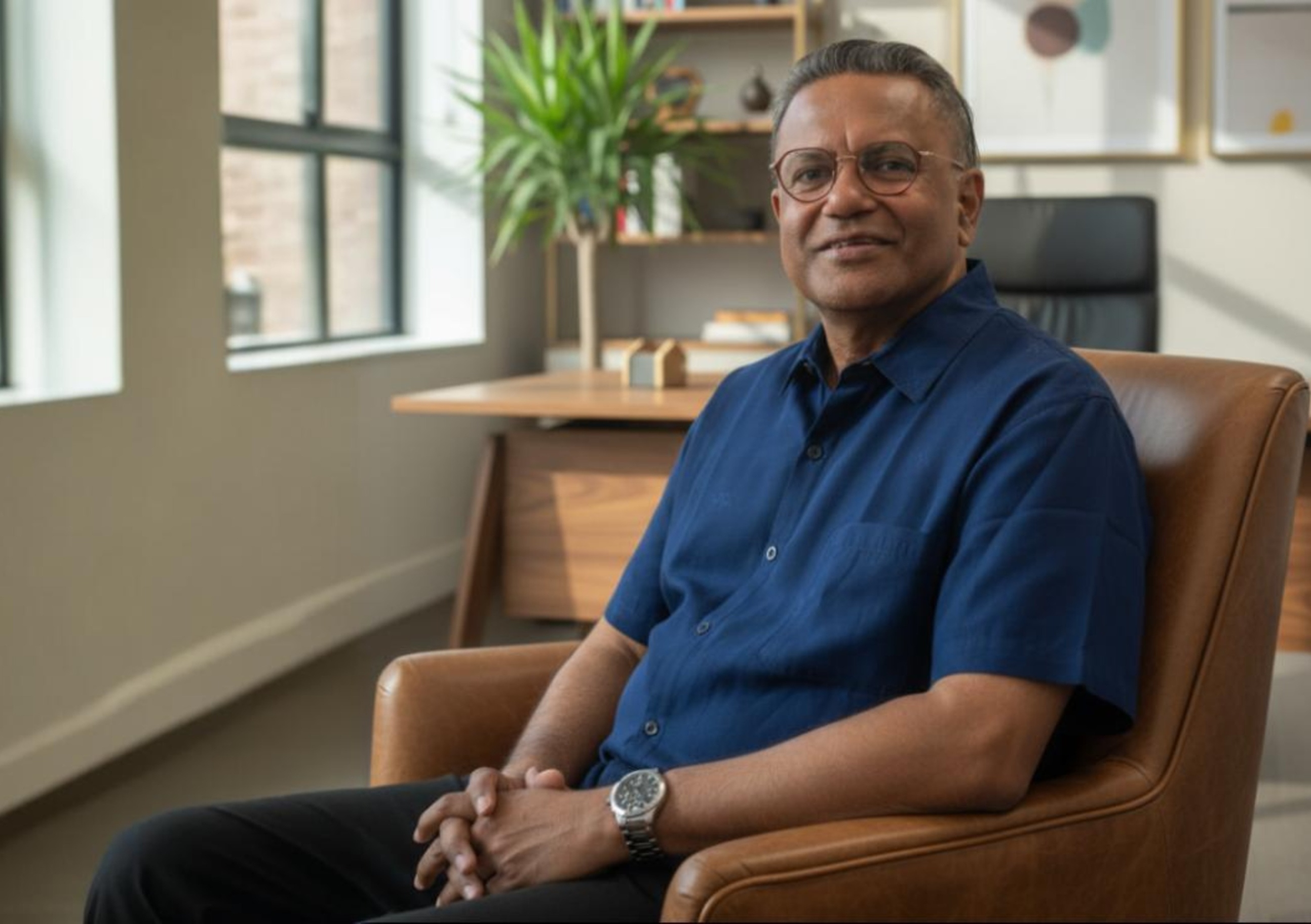An interview with Dr. phil. Mohammed Shafiullah
Dr. phil. Mohammed Shafiullah doesn’t speak like someone with decades of academic accolades behind him, though he has them. There’s a quiet humility in the way he talks and an acuity in his responses that suggest not just deep knowledge but a profound ability to listen.
When you first meet Dr. phil. Shafiullah, you’re immediately struck by his gentle intensity. He speaks about the human brain with calm clarity, effortlessly navigating between the worlds of academic research and applied clinical care. It quickly becomes clear that he is far more than just a deeply analytical mind; a profound sense of purpose and empathy guides him.
A former cognitive neuroscience researcher turned clinician, affectionately known to his professional associates as “Shafi,” he is the kind of therapist who has done, and continues to do, the therapeutic work on himself.
He reflects easily on his past, owns his mistakes, and often credits his personal growth to the clients he now helps guide through addiction and emotional recovery. “Working with others is, in many ways, working on myself,” he humbly admits. “Every session teaches me something, whether that’s about pain, resilience, or purpose.”
At NEOVIVA, Shafi’s blend of intellectual precision and emotional openness has become a powerful force for change.
A mind for science, a heart for healing
Shafi’s path to NEOVIVA began in the world of cognitive neuroscience and psychology. In his early professional career, he immersed himself in understanding the intricate workings of the brain, lecturing, researching, and publishing his findings. But what began in the lecture halls of some of England’s prestigious universities eventually found a deeper, more personal resonance in the therapy room.
The shift from academia to clinical practice wasn’t a rejection of the former but a powerful integration. For over two decades, Shafi immersed himself in cognitive neuroscience, researching attention systems, habit loops, and the biomechanics of mental health; he built a formidable foundation in understanding the brain and, in particular, disorders like ADHD and OCD, fields deeply relevant to addiction treatment.
Despite his success in academia, with numerous papers published in high-profile journals, he says, “I’ve always been interested in working with clients.” He didn’t know back then just how directly applicable his research would become.
The opportunity arose in 2011 when his family relocated from England to Switzerland following his wife’s acceptance of a professorship in the University of St. Gallen. They settled into Swiss life. Then, a role at NEOVIVA allowed him to transition into clinical work without abandoning his academic identity. Instead, he brought it with him, translating scientific insight into therapeutic practice. “At NEOVIVA, I get to see the immediate effects of the work I do,” he says. “That’s incredibly rewarding. I still teach and do research, but it’s this one-to-one work where I get to see real people change that gives my work new meaning.”
He describes witnessing the transformation of clients as a profound experience. “When I see clients go from suicidal ideation to rediscovering hope, it’s hard to put into words how that feels,” he shares. “They’re so grateful, but I always remind them, ‘You did the work, I just helped facilitate it.'”
He can speak at length about neural mechanisms and habit loops and then, without missing a beat, describe the tears of a client who just rediscovered hope. It’s this dual fluency of science and soul that defines his journey. His ability to seamlessly transition from scientific discourse to empathetic understanding reassures clients that they are in the hands of a professional who truly understands their experiences and emotions.
Pioneering therapies in a progressive clinical culture
Shafi is deeply committed to NEOVIVA’s model of care, which combines evidence-based methods with holistic, person-centred practices. He speaks highly of the clinic’s openness to trying new, research-backed approaches, a rare quality in a field that can be rigidly hierarchical. “If you have a good idea and some data to support it, the team here will listen. That culture makes the work so much more enjoyable and satisfying.”
It is due to this environment that Shafi has been able to introduce innovative therapies, such as cognitive remediation therapy (CRT) for attention and impulse control issues and heart rate variability (HRV) biofeedback to help clients regulate emotional responses. Both, rooted in peer-reviewed science, were welcomed.
Shafi’s ability to bridge research and application has become a core part of the clinic’s innovative model, blending academic rigour with deep human care.
The power of being seen
Shafi also shows a deep regard for NEOVIVA’s group therapy format, which is the cornerstone of NEOVIVA’s model. Group sessions run in conjunction with one-to-one therapy to offer clients a more comprehensive and relational path to healing.
“Most clients are sceptical at first. They’re CEOs, leaders, people used to control. They’re not accustomed to showing vulnerability, especially in front of others. But by the end, they often say it’s the best part of the experience. They form bonds and friendships and feel less alone. “By the end, some even become lifelong friends,” Shafi says.
It’s a crucial reminder that addiction is rarely about the substance itself; it’s about isolation, disconnection, and often, unresolved relational pain. “Most of our clients have suffered in silence. They’ve lacked authentic relationships. The group creates this network and helps them feel seen.”
For many, this is the first time they’ve been in a space where they can speak honestly without an agenda or fear of judgement. Group sessions become a microcosm of real life but with more empathy, reflection, and room to be human. “There’s something powerful about being witnessed by others who are going through the same thing,” Shafi explains. “It creates a sense of shared understanding that individual therapy alone can’t always replicate.”
While participation is never forced, the NEOVIVA team is skilled at helping clients feel safe enough to step in, even if only gradually. “We meet people where they are,” Shafi says. “We respect their boundaries, but we encourage them to try. And usually, once they do, they instantly see the benefits.”
Shafi emphasises that recovery at NEOVIVA isn’t about one therapist or one technique. “We work like a Swiss clock,” he says. “Each part supports the other. The group therapy, the one-to-ones, the recovery counsellors, and the aftercare, it’s all integrated.”
A reorientation toward purpose
The nuanced challenges of working with high-net-worth clients aren’t something Shafi shies away from. Many clients arrive in denial, buffered by layers of privilege and success that have enabled their addictions to go unnoticed or unchallenged for years. “There’s often shame, resistance, denial, or a need to ‘run the programme’ like a company,” he notes. But through patience, structure, and education, those defences slowly soften.
The ultimate aim? A reorientation toward purpose. Shafi is adamant that successful recovery involves far more than abstinence. “We’re not just removing substances; we’re helping people rediscover meaning,” he says. “We help them explore: Why are you here? What does happiness mean to you? What kind of life do you want? That existential layer is key to sustainable recovery,” he says.
The clinic’s therapeutic approach is powerfully integrative, he explains. While cognitive behavioural therapy (CBT) is used early on for stability, deeper work often centres on existential therapy, relational therapy, transactional analysis, and psychoanalytic insight. It’s layered, purposeful, and deeply personal to each client.
A therapist shaped by his own journey
Shafi’s compassion isn’t theoretical, and his role at NEOVIVA isn’t just about professional fulfilment; it’s also about personal healing.
His professional past, particularly the pressures of academic life in England, left scars of burnout and emotional volatility. His years in UK academia were, in his words, “full of stress, rage, and exhaustion.” He speaks candidly about past conflicts, including an incident involving a former superior. “I filed a bullying complaint against that person.”
“Looking back, I wasn’t in a good place emotionally. I didn’t know how to regulate myself. I was angry. There was constant pressure to publish and meet overly demanding administrative requirements. It was a system ill-suited to reflection. It took its toll. I realise now that my rage against the system caused a lot of unnecessary pain. Therapy helped me reflect and grow. I’m a different person now than when I was a young academic. I have a sense of the purpose and happiness in life that I want. But working with clients is still healing for me, too.”
Today, he lives a quieter, more grounded life in Switzerland with his wife. Their children, both high achievers, have flown the nest: one holds a PhD from Cambridge, while the other is pursuing a career in medicine.
Shafi and his wife enjoy baking, cooking, walking in the forest behind their home, and travelling whenever they can. “We’re enjoying life more now,” he says with a smile. “When the kids were young, everything was about survival. Now, because we have more time, it’s about joy.”
Oh, and cricket. Don’t forget the cricket. A former national coach in Switzerland, Shafi continues to train the university team. “I love cricket,” he laughs.
What he wishes the world knew about addiction
“People think addiction is about weakness or lack of willpower,” Shafi says, “but that couldn’t be more wrong.”
He explains addiction as a response to pain, as a form of self-medication that becomes maladaptive. “If someone is in physical pain, they take paracetamol. If someone’s in psychological pain, they might reach for drugs, or alcohol, or workaholism.”
But instead of compassion, many receive judgment. This only deepens the wound. “Addiction is often rooted in relational trauma, childhood neglect, grief, or emotional absence,” Shafi says. “We need to stop blaming and start understanding.”
A legacy of listening
When asked what legacy he hopes to leave behind, Shafi doesn’t speak of accolades or academic titles. He talks, instead, of peace. “I want to be involved in creating a world where people listen to each other more,” he says simply. “Where we stop fighting and start understanding.”
He may have brushed this off as “too political” for a clinic profile. However, it captures Shafi perfectly: a scientist who listens, a therapist who continues to learn, and a human being whose quiet openness and idealism makes a very real difference every single day.



0 Comments